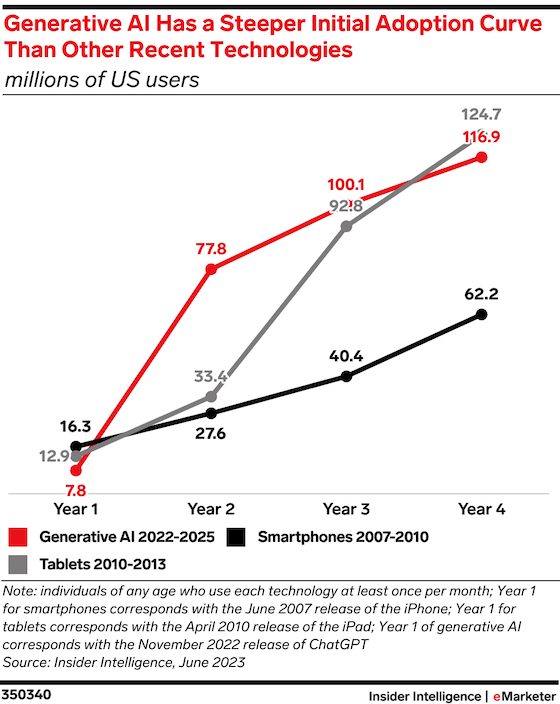Generative artificial intelligence (AI) tools like ChatGPT are seeing rapid adoption, climbing faster than smartphones and tablets did after their release, according to new research from Emarketer.
Emarketer reports that generative AI will reach 77.8 million users two years after ChatGPT’s launch in November 2022. This is more than double the adoption rate of tablets and smartphones in a similar period.
The key factor driving the quick uptake is the low barrier to entry.
Unlike smartphones and tablets, generative AI doesn’t require purchasing new hardware. People can access ChatGPT and similar tools on the devices they already own.
This has allowed curiosity to flourish, although the technology is still novel for many consumers and businesses.
Emarketer expects the growth rate to slow after the initial surge. However, generative AI usage will persist, especially among millennials and Gen Z.
More Context On Growth Rate
Generative AI reached over 100 million users just two months after ChatGPT’s launch. In comparison, smartphones took over two years to get 100 million users globally after the iPhone launched in 2007.
Tablets hit 75 million users globally about two years after the iPad launched in 2010. So, generative AI adoption has vastly outpaced both categories.
 Screenshot from: insiderintelligence.com/content/generative-ai-adoption-climbed-faster-than-smartphones-tablets, August 2023.
Screenshot from: insiderintelligence.com/content/generative-ai-adoption-climbed-faster-than-smartphones-tablets, August 2023.Insights On Demographic Trends
Per Emarketer, generative AI uptake among 18-34-year-olds is nearly double that of older demographics. 13.5% of millennials and Gen Z have already adopted tools like ChatGPT.
Younger demographics are more digitally native and are early adopters of new technologies like generative AI. Their comfort level helps drive the initial surge in adoption.
Use Cases For Generative AI
While generative AI has been around for a while, it exploded in popularity this year as the tech industry’s hottest new thing.
Consumers eagerly experimented with tools like ChatGPT to create poetry, Midjourney to generate art, and AI chatbots from Google and Microsoft integrated into search.
Now that the initial frenzy has calmed down, questions linger about which generative AI applications will have staying power for businesses.
Marketers, in particular, are wondering how they can best take advantage of these new capabilities in impactful ways in the future.
Opportunities & Risks For Marketers
For SEO specialists and digital marketers, generative AI presents opportunities and risks.
AI-powered search, like Google’s Search Generative Experience (SGE), aims to improve search quality. However, there’s concern that SGE could surface more low-quality content.
Google CEO Sundar Pichai dubbed Google’s SGE a “clear quality win” during a recent earnings call, but not all experts agree.
Chatbots, like ChatGPT and Google Bard, show promise for marketing applications like customer service, data analysis, brainstorming, and more. Still, human oversight remains critical.
Looking Ahead
As generative AI continues evolving, marketers should closely monitor developments.
With careful testing and evaluation, there is potential to harness these tools while mitigating possible downsides.
For now, curiosity and experimentation will likely drive further adoption.
Featured Image: sizsus art/Shutterstock




